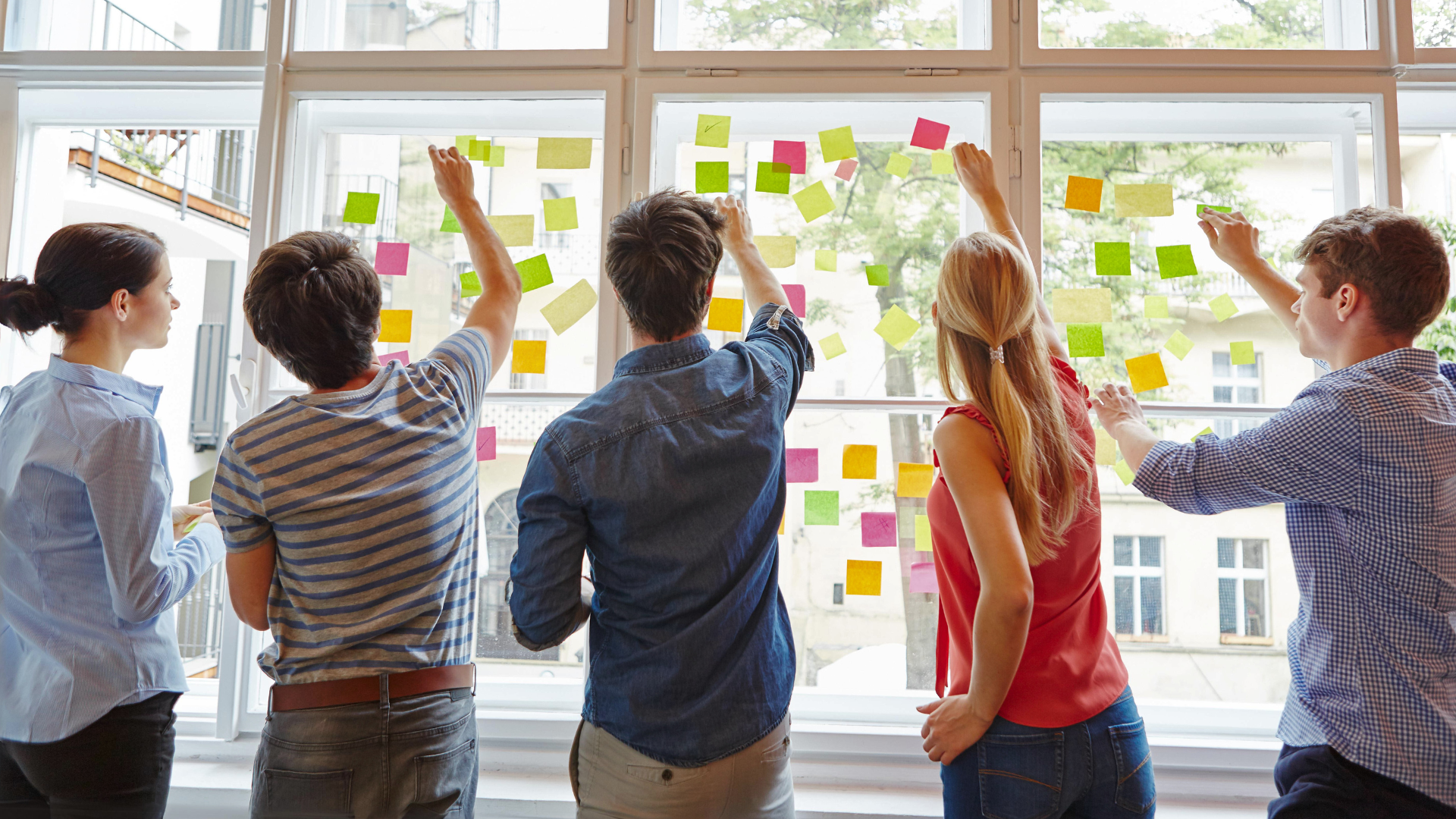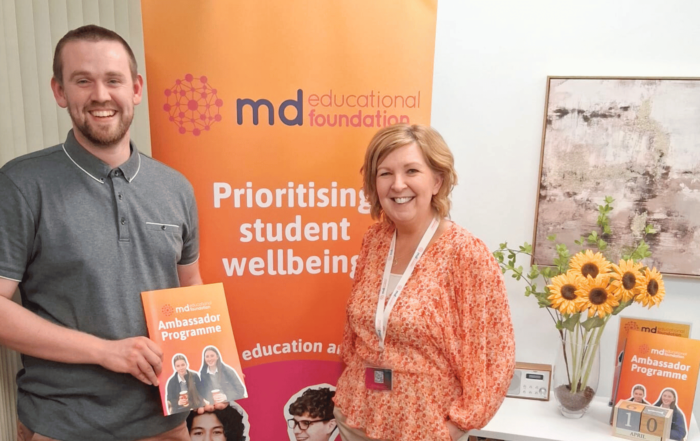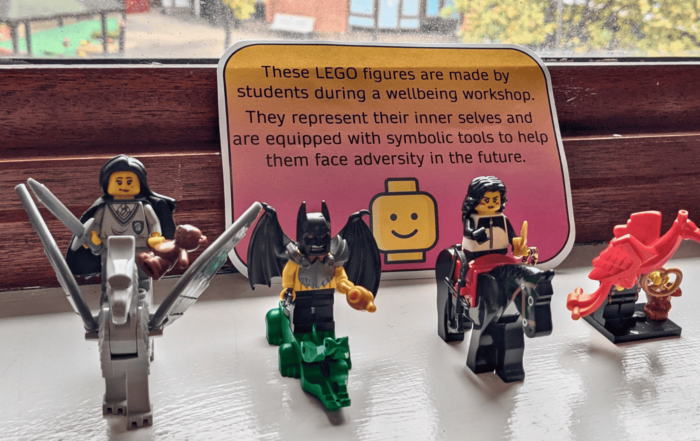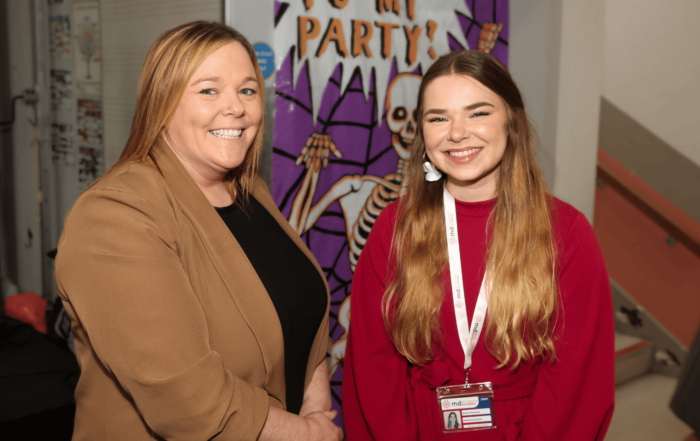We’re currently experiencing a wellbeing crisis in education, with rates of probable mental disorders in 17-19-year-olds rising from 1 in 10 in 2017 to 1 in 4 in 2022 (NHS, 2022). This highlights even more the importance of nurturing the mental health and wellbeing of students. Early intervention is crucial when it comes to preventing the wellbeing of young people from declining.
Workshops are a great way to engage with young people and encourage them to take care of their mental health and wellbeing. Workshops can provide many advantages when it comes to improving student wellbeing – one of the key ones being building resilience.
By participating in mental health and wellbeing workshops, students can gain valuable skills when it comes to navigating challenges and setbacks and learn to prevent situations that might have a negative impact on their overall wellbeing. Workshops can provide students with different tools and resources that they can then later use. They also help students to recognise, understand and manage their own emotions, as well as those of others. Most importantly, students are empowered to take an active role in their growth and wellbeing to help them navigate through education and beyond.
Catherine Llewellyn, a Clinical Supervisor at mdeducational foundation works closely with the Wellbeing Leads that have been placed in schools and other educational settings to promote positive wellbeing for students through the delivery of a wellbeing curriculum. One crucial part of the wellbeing curriculum is to host workshops for the students to support them with issues they might be struggling with. Catherine shares below her thoughts and experiences of workshops:

“Although there can be common wellbeing themes for students such as anxiety, low mood, exam stress, concerns for the future and relationship difficulties, there is no one-size-fits-all for supporting young people’s wellbeing. We need to be meeting young people in the place they are at rather than expecting them to meet with us. This is why providing an informal, non-expectant, safe space for them to share and just ‘be’ is crucial for young people, enabling them to explore their own needs and find solutions that work best for them.
It’s important for us all to find a way to connect and belong, and in order to do this with young people, we need to think outside of the box. I’ve found that when working therapeutically with young people, it can be useful to add an element of creativity! It can feel much easier to talk or express what might be going on for someone when doing something creative or collaborative at the same time. Increasing creativity, physical activity and openness to other expressions can extend and deepen the dialogue between two individuals or a group in a therapeutic setting. Creative interventions help individuals become aware of sensations, emotions, images and relationships, and can be a great way for young people to tell their story in their way.”
5 Wellbeing Workshop ideas from an expert to improve student mental health and wellbeing
As an expert, Catherine has provided five practical and useful intervention ideas that schools can implement to enhance student wellbeing and mental health.
These following ideas are good ways for young people to express themselves within a Wellbeing Hub setting. At the end of this blog, we have also included a bonus one from Aishah Akorede – Founder of Recrowned Ireland & Miss Universe Ireland 2023, who shared her inspiring session of Breakdown Before Breakthrough with us.
Workshop Idea 1 – Therapeutic Puzzles
Using puzzles to create ideas around self-care can be a great conversation starter between a wellbeing professional and a young person. Puzzles can be filled with positive affirmations, self-care tips or inspiring ideas. They can be purchased online and personalised around the themes that are deemed important to your students.
Working on a puzzle together while talking can be very valuable. Once completed you can then consider together the self-care ideas and which ones might be useful for the student. Therapeutic Puzzles are a great resource for reminding students of useful ways to cope when things feel too much.

Workshop Idea 2 – Getting to Know You Jenga
The ‘getting to know you’ version of the game of Jenga is an easy and practical way to get conversations going with students. You need a game of Jenga to start, then simply write prompts on each block. Alternatively, you can have discussions with students and let them write down their ideas and things that worry them. This way, the wording of the sentences will be approachable and provide a feeling of belonging to the students.
After writing the prompts, play the game as you usually would, whilst getting to know students through the (non-intrusive) questions on each block. Playing Jenga with question prompts is a great conversation starter or even just a relaxing game to play with friends in the hub.
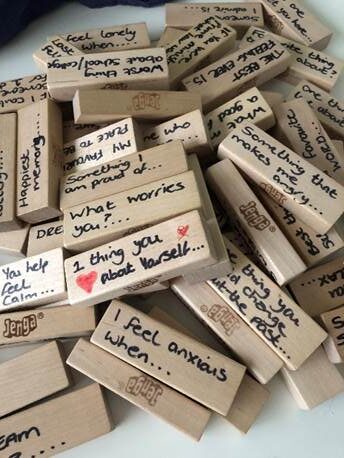

Workshop Idea 3 – Developing Strategies to Understand and Manage Anxiety
Anxiety is a common feeling among students, so it’s important to be able to recognise it and learn how to manage it. A good workshop for this involves an exercise to illustrate where we feel our anxiety and how it shows up.
To do this exercise, start by asking students to answer two questions and draw their answers for each one:
- Where is my anxiety/worry?
- Draw a map of where in the body I feel symptoms of anxiety and worry
- How does worry affect us? Mentally/ physically?
- Draw or create auditory/ visual symbols of where and how I feel worry or other symptoms.
Then, discuss the feelings of anxiety that they illustrate and how these can vary from person to person. Reassure students that all their feelings are normal responses to anxiety and that there are tips and resources to help ease them.
Then pose another question: ‘How do I manage when I’m not feeling ok?’ and use their answer as a discussion point. At this point, we can provide the young person with different options for managing and preventing anxious feelings, for example, to use daily affirmations like ‘I am ok’, ‘I can ask for help’ or to learn breathing techniques that will help to calm anxious feelings. For more anxiety-coping statements in the image below.
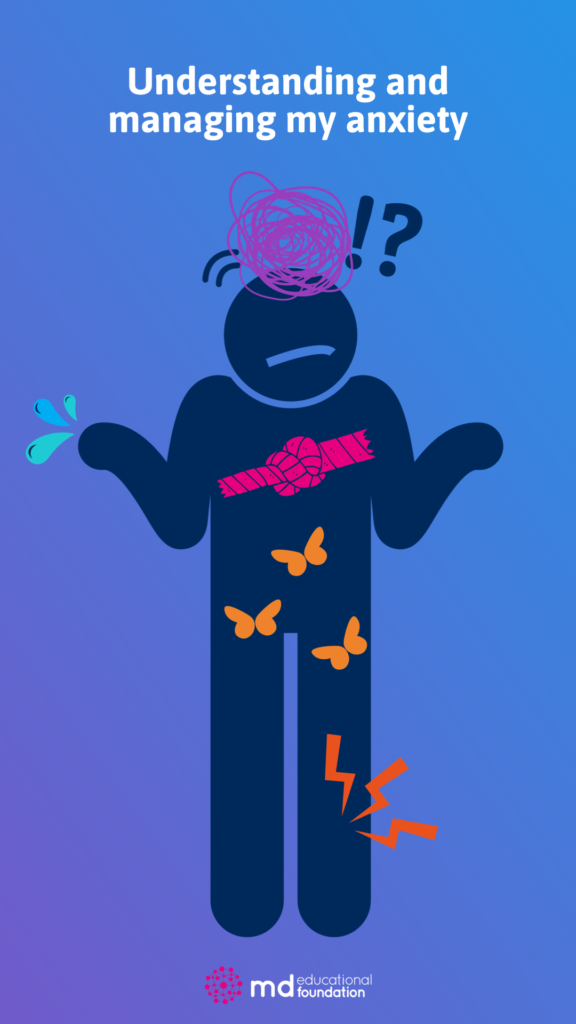
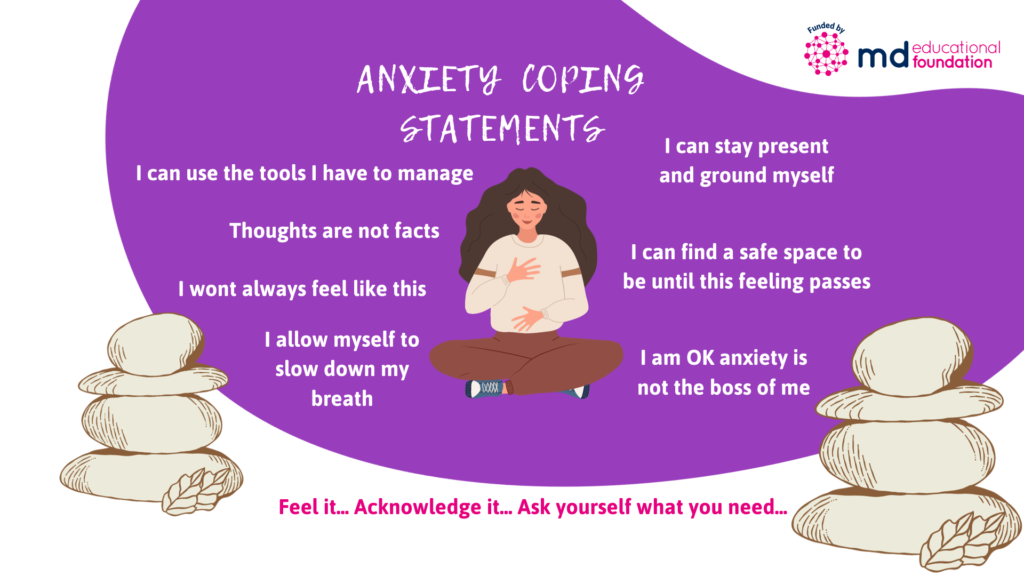
Workshop Idea 4 – Identity Coat of Arms
The Identity Coat of Arms workshop is an opportunity for students to think about themselves and focus on who they are and what matters to them. This exercise helps students find their identity and can be a great way to remind them of things that help them feel more grounded and happy.
Let students fill in their own Identity Coat of Arms, in which they write, draw or cut images from magazines of things that are important to them, things that relax them, words that describe them and their hopes for the future.
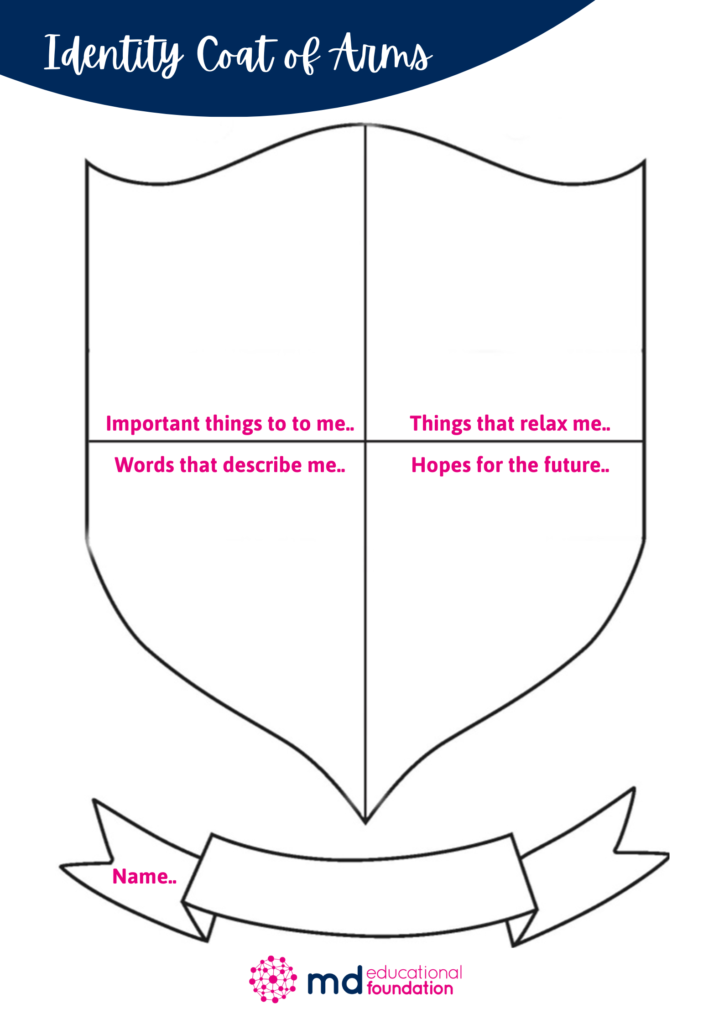
Workshop Idea 5 – Self-Care Boxes
Self-Care Boxes are a great way to recognise the tools or ways of coping that we as individuals use. It encourages students to learn more about themselves and discover the most useful self-care strategies for them.
One of the box ideas is a Self-Soothe Box, where we fill a box with things that can help the young person feel better when they are experiencing anxiety, feeling unsafe or upset. It’s always a good idea to create a sample box to inspire students and help them see the kind of items that could be added to a Self-Soothe Box.
A box could include things like positive affirmation pebbles, favourite sweets, soothing photographs, a colouring book, and a list of helpline numbers. It can then be explained to students how these items might help soothe, assure, relax, and positively distract.
It can also be fun and impactful to decorate a ‘mini me’ to keep in the Self-Care Box as a reminder to students to care for themselves.
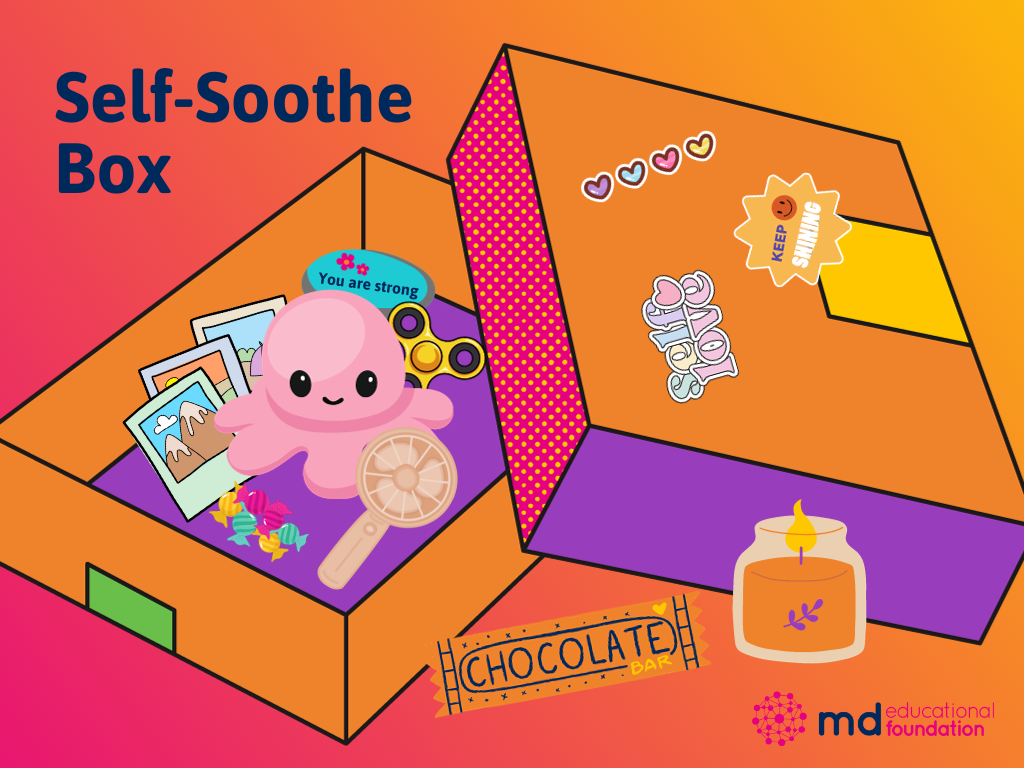

Bonus Workshop Idea – Aishah Akorede’s, Breakdown Before Breakthrough
We had the honour to hear from Aishah Akorede, the Founder of Recrowned Ireland & Miss Universe Ireland 2023, who shared an empowering session with us during mdeducational foundation’s launch in Ireland at Mount St. Michael Secondary School in Claremorris.
During Aishah’s workshop, she explained that often in life, we need to ‘break down’ before we can make our ‘breakthrough’. She described how we shouldn’t let our insecurities and fears hold us back from showing our full potential.
For the interactive part of the workshop, the students at Mount St Michael Secondary School were asked to write down their insecurities and things that were holding them back. They then put these written thoughts inside their balloons and blew them full of air. Finally, they let their insecurities go and had their breakthroughs by popping the balloons at the end of the event!
This is a great activity to add to a workshop where the theme is building resilience or confidence. Visual and interactive representations of letting something go can help students express their feelings more easily than putting them into words and give them a more memorable session.
How can mdeducational foundation help your school to improve the wellbeing of your students?
At mdeducational foundation, we are aiming for a world in which every student has access to the wellbeing support that they need, without delay. That’s why we provide full salary funding to place professional Wellbeing Leads in educational settings across the UK and Ireland to promote positive wellbeing through the delivery of a wellbeing curriculum. We understand the profound influence of wellbeing workshops on students and that’s why a large part of the curriculum delivered by our Wellbeing Leads is about promoting positive wellbeing through workshops.
Wellbeing Leads are qualified wellbeing professionals who are placed in schools to normalise student psychological fitness and resilience through guidance and early intervention. This way, we can offer tools and resources to support student wellbeing – one of these resources being Wellbeing Workshops. Here are 5 more ideas from one of our UK-based Wellbeing Leads.
Would your educational setting benefit from a professional Wellbeing Lead? Let’s chat and see how our team at mdeducational foundation can help to improve the wellbeing of your students – express your interest today by contacting us.
Prioritising student wellbeing through education and beyond
mdeducational foundation is a charity that provides a three-year salary-funded commitment to placing dedicated wellbeing professionals within educational settings, enabling them to kickstart their long-term wellbeing strategies.
Related posts
Championing student wellbeing: Meet James Sweeney, the first mdeducational foundation Ambassador
At mdeducational foundation, we’re committed to prioritising student wellbeing - and now, we’re continuing that mission by inviting members of our community to join us in championing a brighter future for young people. We’re [...]
6 mental health workshops to support and improve the wellbeing of young people in schools
Wellbeing workshops are a great way to promote positive wellbeing, encourage young people to look after their mental health and remove the stigma around mental health and wellbeing. In schools, workshops can provide many [...]
Shining the spotlight on student wellbeing: Meet Susanna Neuvonen, Marketing Executive at mdeducational foundation
At mdeducational foundation, we’re dedicated to prioritising student wellbeing by providing fully funded support in schools and educational settings across the UK and Ireland. Our mission is to ensure that all post-16 students feel supported [...]
